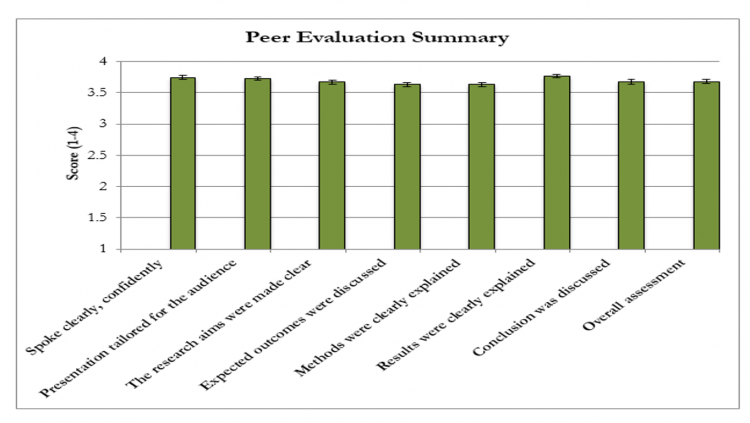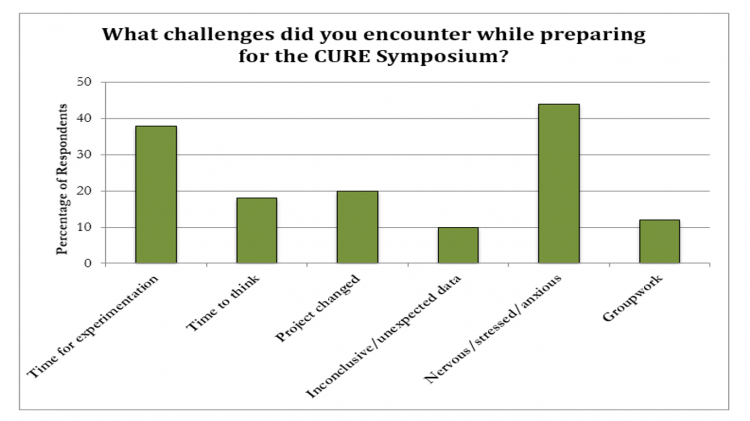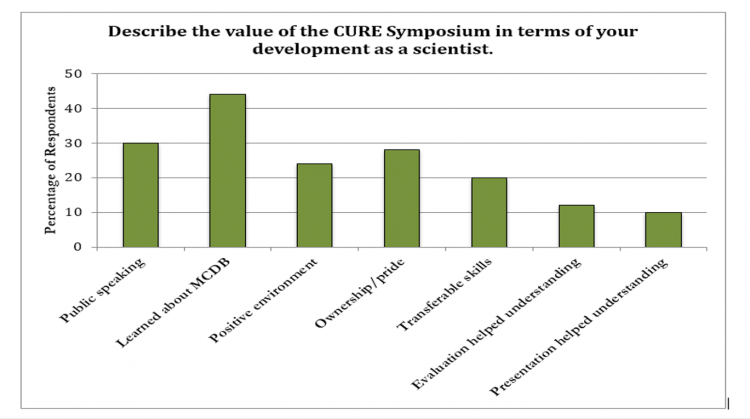Student Work
For the purposes of this portfolio, only Discovery Lab II is reported for spring 2019. This was the first semester in which both the redesigned curriculum and reflection were implemented.
Part I. Peer Assessment of Posters Presentations
Overall, the assessments were positive, with peer evaluations across all posters averaging 92.3%. Prior to implementation using the same evaluation in spring 2018, the average of the peer review was 90.5%. Each of the categories assessed in spring 2019 scored on average above 89% with no one category significantly lower than the others. The lowest grades were in the categories of explaining expected outcomes and methods. Comments were generally supportive with the few general critiques mostly focusing on the volume or speed of the speaker. However, of note, 47 reviewers commented on 25 posters that there were deficits in the presentation of the results, specifically asking more detail.
“Discuss results a little bit more in depth. You have interesting results and it would be fun to discuss them with your audience.”
“Go more in depth content is super interesting wanted to hear more”
“I would recommend limiting the methods and go over basic information and focus on the results.”

Part II. Student Reflections
Challenges of the Research and Symposium
Forty-four percent of students explained that they experienced a good deal of stress and/or anxiety related to being asked questions during their presentations. Common concerns included not knowing what questions were going to be asked and sounding professional and well informed.
“Some challenges I faced before the CURE symposium were being worried about knowing if I knew enough about the cellular effects of my compound. After reading scientific journals, I had a general idea of what it did, but was concerned about questions that I might get and not knowing how the drug really works therefore being unable to answer questions that were asked. It was difficult for me when trying to practice what I was going to say because I didn’t know how to alter the information I was saying to different audiences. I wasn’t sure how in depth or not in depth I was supposed to be going for the different people I would be presenting to.”
“Trying to figure out the best way to express the things that we want to say while still fitting it in the poster and sounding professional was the hardest.”
However, in most cases, students indicated that they felt more comfortable once they started to present and realized that the audience was interested and supportive.
“All the anxiety and stress just disappeared once I got to start talking about the project, because I looked at as just having a conversation about what we did and how it came out.”
Another common challenge students experienced was feeling that they did not have enough time to finish the experiments they planned or to evaluate their data when the experiments were complete. This is a common problem in science – not having the time to do everything and feeling that the work in incomplete. About 30% of students struggled with experimental plans that changed due to the model organism not developing as expected or limited resources (reagents or flies) or inconclusive data. These results emphasize a need for resources to manage the unexpected in a scientific lab, which is known to be an issue among early career scientists. To address this, the Discovery Labs are taking part in Failure as a part of Learning: A Mindset Education Network (FLAMEnet), an NSF-funded set of psychosocial interventions that are designed to help students manage failure and challenges in the lab and classroom. As a founding member of FLAMEnet, I am highly motivated to develop and implement the interventions and learn from the outcomes to assist students with this issue.

Experience at the CURE Symposium
When asked about their experience at the CURE Symposium, the response was overwhelmingly positive with nearly all students explaining that it was an enjoyable and useful experience. Many students reported that the Symposium was “better than expected,” which qualitatively correlated with the realization that they were well prepared to present their research. In fact, 28% of them responded to the open ended questions by stating that they felt pride in presenting their work.
“Looking back on the lab and the symposium, I am proud that I was able to let others see the research I put work into. I appreciate that I have experience at a research presentation event because I will hopefully attend more as I progress in my education.”
“I am proud of what I have accomplished in Drug Discovery and am thankful that I was given an opportunity to show it off.”
“It was interesting to see what other classes had produced throughout the semester. I was proud of what my group created, so I was excited (and nervous) to present it.”
Students reported receiving training in transferrable skills like explaining science to the lay person, preparing a research poster, and interpreting scientific data that would serve them later in their science careers; public speaking was specifically indicated by 30% of the students. Forty-four percent of responding students said they will use information from presentations by other classes to make enrollment decisions and to help choose a lab for further research experience.
“I also enjoyed how all different types of labs were incorporated into the symposium; the symposium gave the great opportunity of exploring other research-based labs that sparked my interest for future classes to take.”
“I got to see future classes I could be interested in, as well as seeing what other students around me had done. I thought the upper division classes experiments were AWESOME and that I definitely was interested.”
“…it was a great way to see other MCDB lab classes that I would want to take. I was able to see what I would be doing in each class, what I would be learning, and I was also able to ask the presenters they’re overall feeling of the course.”


